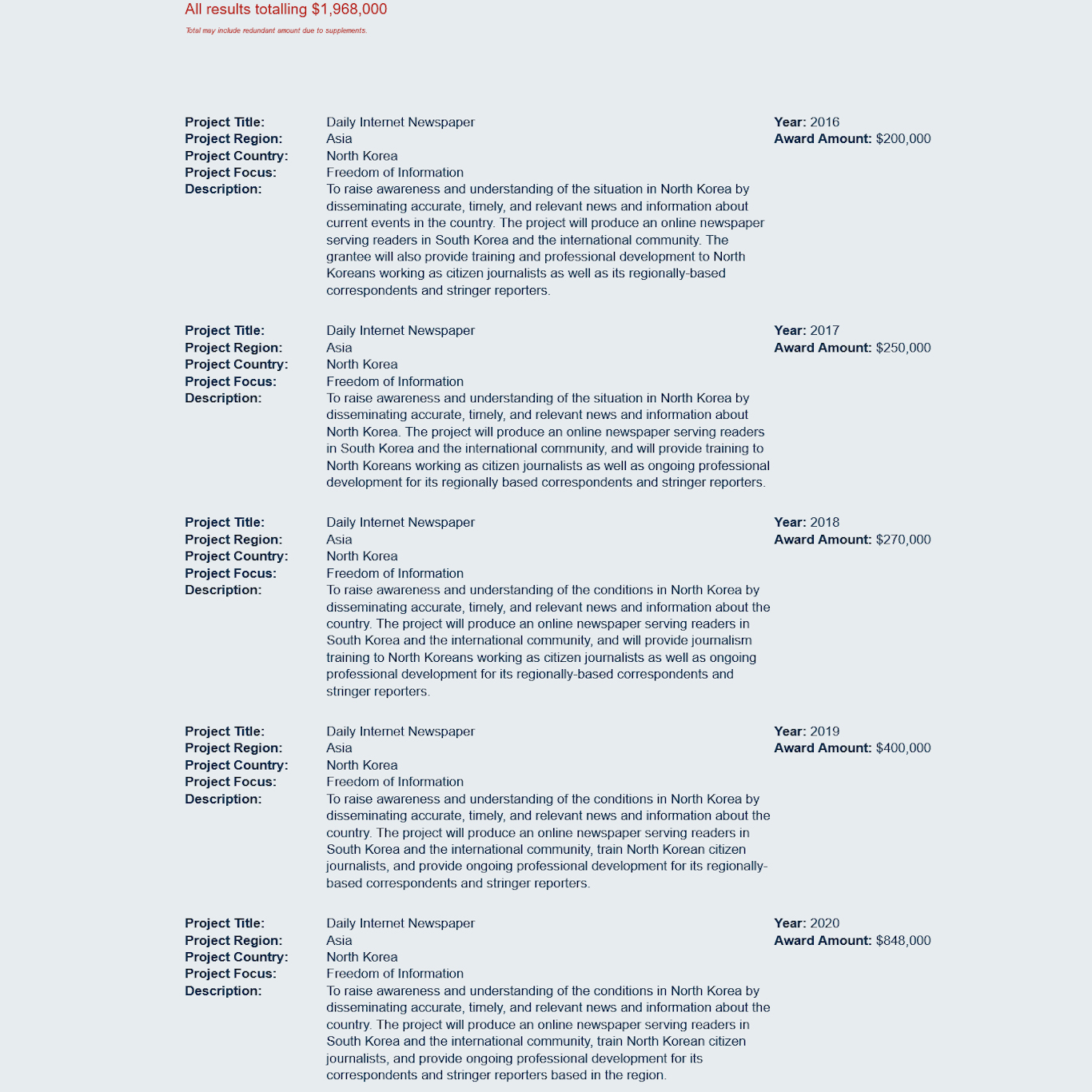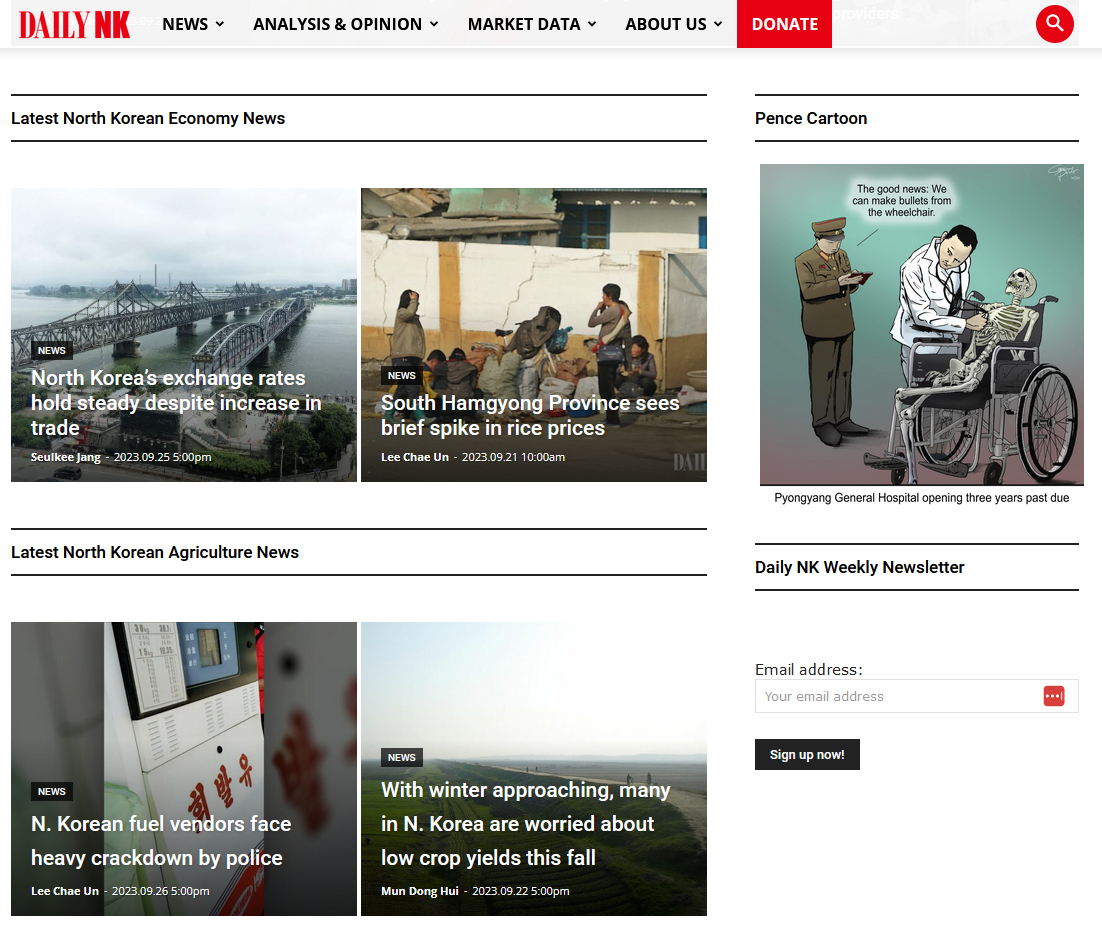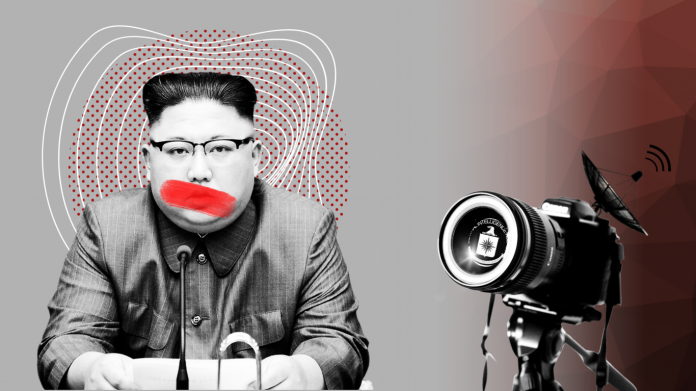Remember when Kim Jong-un died? Back in 2020, corporate media was awash with reports that the North Korean leader had died or was in a “vegetative state.” Yet, just days after the media frenzy, he appeared alive and well. So how did the likes of CNN, MSNBC and The Economist get the story so disastrously wrong? By relying on hearsay from outlets funded by the CIA cutout organization, the National Endowment for Democracy (NED).
As The Washington Post explained, rumors about Kim’s health first hit the headlines after The Daily NK, a South Korean website known for “gossip and rumors,” published a report based on an anonymous source. From there, unnamed U.S. officials appeared to support the story. Laughing the affair off, the Post offered some advice to its competitors. “South Korea’s news media isn’t always the most reliable source even under normal conditions,” it wrote, and, on U.S. officials, it noted, “Don’t trust, verify.”
And yet, despite this, the Post has since continually run stories based on Daily NK reports, treating the outlet as a trusted news source. This is particularly egregious because, although the Post did not mention it, the Daily NK is part of a vast network of Korean outlets funded, promoted and supported by the NED, an organization created by the Reagan administration as a front group for the CIA, carrying out many of the agency’s most controversial psychological operations, including influence ops and regime change programs.
In fact, a vast amount of the news we in the West hear about the Democratic People’s Republic of Korea (DPRK) comes courtesy of organizations with deep ties to the U.S. national security state, helping explain why the country is seen as perhaps the most bizarre and frightening on the planet.
Follow the Money
The Daily NK is a web outlet publishing news about North Korea in English, Korean and Chinese. Its influence is substantial, and its reports have been cited in a wide range of Western media, including The New York Times, CNN, Fox News, and CNBC. The Daily NK employs many defectors from the North and maintains a network of informants across the country. These informants are paid higher sums for bigger, juicer stories, something that even the South Korean government has warned has led to a “flood of raw, unconfirmed reports” muddying the waters and making it more difficult to monitor the country accurately.
However, few citing the paper’s reporting note its problematic funding source, even though The Daily NK is relatively transparent about it. The FAQ section of its website, for example, notes that “A large portion of Daily NK’s funding sources is in the public sphere. One of our biggest donors is the US-based National Endowment for Democracy (NED), and information about NED grants Daily NK has received can be found here.”
The National Endowment for Democracy has funneled millions of dollars to The Daily NK. Incomplete funding records show that, between 2016 and 2020, the outlet received $1.97 million from the agency. Yet The Daily NK was also receiving annual six-figure sums from Washington at least as far back as 2011.

Noting that the outlet is aimed primarily at South Korea and the international community, the NED claims its goal in funding The Daily NK is to “raise awareness and understanding of the situation in North Korea by disseminating accurate, timely, and relevant news and information.” Yet, as we have seen, it is often the source of dubious or even demonstrably false stories about the secretive state.
Tim Shorrock, an investigative journalist who has covered Korea since 1983, explained to MintPress how Washington has created an echo chamber by funding a myriad of groups, all purporting to be independent and unbiased, but all singing from the same U.S.-written sheet:
Basically all U.S. media coverage of North Korea is set by the national security state. The NED funds ‘The Daily NK’. It’s never identified on Twitter or elsewhere as state-sponsored; it is often quoted in the mainstream press as a South Korean-based news service. But it is funded by the NED. And they have spread some of the most outrageous stories on Kim Jong-un and his government that were later found to be false.”
A Sprawling Network of Disinfo
The Daily NK is affiliated with Unification Media Group, a Seoul-based multimedia consortium including Radio Free Chosun and Open North Korea Radio. The group claims that 2-3% of North Koreans have engaged with their content. Like The Daily NK, Unification Media is funded with a war chest of millions of dollars from the NED. Between 2016 and 2019 alone, the group received more than $2.4 million in NED money. Together with The Daily NK, this accounts for well over 20% of the NED’s entire DPRK budget. In 2018, the NED also gave its annual Democracy Award to the organization.
Unification Media is just one of a myriad of outlets, NGOs, and think tanks that the NED props up to shape DPRK coverage. The group also funds Korea Future, the now-defunct Free North Korea Radio, and, although it does not admit to it anywhere on its website, influential human rights group NK Watch is also the recipient of hundreds of thousands of NED dollars – money that it gives NK Watch to pursue “international advocacy” such as pressuring international organizations like the United Nations on North Korea.

Radio Free Asia is another highly influential source of outlandish news on North Korea. Once described by The New York Times as part of a “worldwide propaganda network built by the CIA,” Radio Free Asia was established in 1951 to bombard China and its neighbors with anti-communist propaganda. To this day, the outlet has stayed true to its founding mission and is a frequent source for many of the most bizarre and dubious stories about China and the DPRK. For example, when images of Uyghur Muslims celebrating Eid in Xinjiang Province went viral, Radio Free Asia reported that thousands of worshipers were being forced to celebrate. The network also claimed that a man smuggling copies of “Squid Game” into North Korea was sentenced to death.
Conservative South Korean tabloid, the Chosun Ilbo, also has extensive ties to the U.S. While not directly funded by the NED, it has organized and sponsored conferences on North Korean human rights alongside the NED. And in 2003, North Korean defector Kang Chol-hwan, a writer for the Chosun Ilbo, was presented with an NED Democracy Award.
Who Are the NED?
But why is taking money from the National Endowment for Democracy so problematic for media organizations or NGOs? Because the NED was created specifically to carry out regime change operations around the world.
In the wake of a series of public scandals that seriously hurt the credibility of the CIA, the Reagan administration established the NED in 1983. Technically a private entity (although funded and staffed by the U.S. government and its officials), the NED acted as a front group for the CIA, carrying out many of its most controversial operations abroad to give the U.S. some level of plausible deniability.
In their more candid moments, NED leaders are explicit about the organization’s role. “It would be terrible for democratic groups around the world to be seen as subsidized by the CIA,” Carl Gershman, NED president from 1984 to 2021, said, explaining why his organization was set up. NED co-founder Allen Weinstein agreed: “A lot of what we do today was done covertly 25 years ago by the CIA,” he told The Washington Post.
The NED was crucial in interfering in the 1996 Russian election to ensure U.S. puppet Boris Yeltsin would remain in power. Six years later, it bankrolled a coup attempt against Venezuelan president Hugo Chavez.
In Ukraine, the organization played a key role in the successful 2014 Maidan Revolution and has since financed a wide range of media organizations to ensure the Ukrainian public is flooded with pro-U.S., anti-Russian messaging.
In recent years, the NED has channeled money to the leaders of the Hong Kong Protest movement, fomented a nationwide protest campaign against the Cuban government, and attempted to overthrow the Lukashenko administration in Belarus. They have also been cataloged as interfering in elections in France, Panama, Costa Rica, Nicaragua and Poland.
Therefore, given that the NED functions as the CIA’s regime change arm, any organization accepting money from such a group must be treated with a high degree of suspicion.
Reports of My Death Were Exaggerated
A result of this is that Western audiences are bombarded with bizarre, lurid and far-out stories about North Korea, most of which are sourced to intelligence-aligned sources, and many that turn out to be demonstrably untrue.
In 2013, for instance, Western media was awash with reports that popular singer (and reputed lover of Kim Jong-un) Hyon Song-Wol had been abruptly executed (e.g., CNBC, Los Angeles Times, Salon, Huffington Post). Media delighted in describing the gory details, reporting that Hyon had made and distributed a sex tape, that she and others were found with bibles on their person, and that she had been killed in a “hail of machine gun fire while members of her orchestra looked on,” or that her family had been forced to watch the ordeal.
There were two problems with this story. Firstly, it was based entirely on anonymous sources speaking to the U.S. government-linked Chosun Ilbo, an outlet with a long history of publishing questionable news on North Korea. And secondly, it was completely untrue. Shortly after her execution became worldwide news, Hyon Song-Wol performed on North Korean television and went on to tour internationally.
This is far from the only time reality has got in the way of a good story. In 2019, after negotiations between the Trump and Kim administrations soured, corporate media again buzzed with reports that the North Korean leader had taken his anger out on his negotiating team. Chief diplomat Kim Yong-chol was reportedly sent to a prison labor camp for his failures. At the same time, other envoys on the team were executed (e.g., New York Times, Wall Street Journal, Fox News, ABC News), which CNBC described as a “massive purge to divert attention away from internal turmoil and discontent.” Again, the dozens of breathless reports of pointless barbarity were based solely on unverified claims made by the Chosun Ilbo, showing once more how hungry for salacious gossip Western media truly is.
Only a few days after the farce, Kim Yong-chol appeared alongside Kim Jong-un at a high-profile art performance.
Other prominent Koreans that have “risen from the dead,” according to Western media, include General Ri Yong-Gil, who was “executed” in 2016; Kim Jong-un’s aunt Kim Kyong-hui, who was reported dead or in a “permanent vegetative state;” and Yun Jong-Su, who performs the extraordinary feat of coaching the national soccer team, despite reportedly being shot in 2010.
Unreliable Sources
Much of the reporting on the DPRK relies upon accounts from defectors. Yet, this is highly problematic, as defectors are often paid handsomely for their testimonies, meaning they are incentivized to paint as exaggerated a picture as possible. If they can land a deal with the NED, those who choose to become celebrity defector activists can live the high life. The deluge of American money and the demand for gory accounts of life in the North drove up the supply, and many defectors were only too happy to say what Washington wanted to hear.
The spouses of [defector-activists] bought department store handbags and financed their households with NED money,” one activist noted.
Some defectors have become household names and make huge sums of money. For example, Yeonmi Park (who claimed that there is no word for “love” in North Korea) charges between $12,500 and $17,500 plus expenses per speech. After being brought to Washington by the NED, Yong-Ho successfully ran for the South Korean national assembly.

But this is not the norm for most coming from the North. Most North Koreans living in the South scrape by on low incomes and face widespread discrimination, isolation and loneliness. Often, their skills do not transfer over, meaning they can only find the most menial employment. North Korean defectors are six times more likely to be in the lowest income bracket than the general population. It is little wonder that so many choose to play ball with U.S. and South Korean authorities. And it is clear what sort of testimonies those authorities want.
“The more North Korean defectors embellish their stories, the better. That’s how they get famous,” Shorrock told MintPress. South Korean media is full of horror stories about the North.
One example is the popular TV show “Now On My Way to See You,” where celebrity defectors are paid $2,000 per shoot to tell their stories. Some, however, have testified that they were given scripts to read, full of false stories about cannibalism and other gruesome tales. Guests on the show must constantly one-up each other or risk never being invited back, meaning they would fall back through the cracks of South Korean society.
The reality is that most North Koreans who leave are economic migrants, and many wish to return once they have saved enough cash. But “I left the DPRK to make more money in China or South Korea” is not going to hold attention or generate clicks, so these people’s stories are never heard.
All the (Fake) News That’s Fit to Print
Western media, therefore, have turned the country into a caricature – one where its leader kills his relatives by feeding them to a “pack of starving dogs” or throws his top generals into piranha-infested tanks.
These are examples of what media critic Adam Johnson has described as “the North Korea Law of Journalism,” where journalistic and editorial standards about a state are inversely proportional to that country’s enemy status. Put simply, while news outlets must continue to report responsibly on friendly nations, they can and do publish demonstrably false content about enemy nations. Perhaps there is no better example of this than the DPRK, where serious outlets can claim that only one hairstyle is allowed, that the country has banned sarcasm, and where “experts” can assert that electricity and tall buildings are “unknown” inside the country, or that the North Korean government hides the existence of Africa and Australia from its citizens.
Other enemy nations fall afoul of the North Korean law of Journalism, too. Corporate media has reported blatant falsehoods such as hamburgers costing $170 in Venezuela or condoms going for over $750. It was also widely reported that the country’s people were so hungry that some broke into a Caracas zoo and ate the animals. However, the DPRK’s relative isolation and lack of communication have made this problem even worse. And with “crazy North Korea” stories continuing to go viral and seemingly no negative consequences for outlets who publish fake news, it is a problem that is not going away any time soon.
The Forgotten War
Another dimension to the coverage is political. The United States intervened in the Korean War (1950-53), propping up a puppet administration in the South and preventing the peninsula from unifying under a communist government. The U.S. practiced widespread carpet bombing, dropping more explosives on Korea than the entire Pacific theater during World War Two. This included using chemical and biological weapons. As a result of American actions, an estimated 20% of the North Korean population was killed.
While an armistice was signed in 1953, no formal peace deal was reached. As a result, the war is still technically ongoing. Tens of thousands of U.S. troops continue to be stationed in South Korea across 73 military bases. These troops regularly participate in war games with their South Korean counterparts, simulating invading, bombing or destroying the North.
During the 1950s, 1960s and 1970s, North Koreans enjoyed a higher standard of living than their southern neighbors. But with successful state-led development in the South and the decline and collapse of the U.S.S.R., North Korea went into an economic tailspin that Shorrock notes it has still not recovered from. The U.S. capitalized on the chaos, levying widespread sanctions to cause as much pain as possible. This helped drive a famine that killed hundreds of thousands of people.
It is this context that drives so much of the hostility towards Washington in Pyongyang, Shorrock noted, adding, “This hatred of North Korea and the refusal to look at the history of the U.S. in Korea blinds the media and the public about the actual stakes there and what is really going on.”
The NED, of course, would rather this history were not known, as it undermines the U.S.’ attempts to present itself as an innocent bystander when it is, in fact, a prime political actor on the Korean Peninsula.
State-Sponsored News
Like Venezuela, the Democratic People’s Republic of Korea has serious and pressing economic, social and political problems. Yet Western corporate media eschew accurate and thoughtful commentary on the country in favor of cartoonish caricatures about an evil government and an unthinking, brainwashed population of drones.
As a lifelong Korea watcher, Shorrock was particularly dismayed by the quality of the coverage:
The situation in North Korea is bad enough; you don’t have to make shit up! It is an authoritarian state, and they have been struggling for 20–30 years (since the Soviet Union disintegrated). But these [false] stories just get repeated and repeated without checking for basic facts. It’s just shameful.”
This state of affairs is no accident: the National Endowment for Democracy has spent tens of millions of dollars funding an ecosystem of media outlets, defectors, NGOs, think tanks and other experts who all sing the same song on North Korea. This is done to soften the American public to the idea of war or regime change in the North. And it has had a considerable effect. In 2017, a remarkable 54% of Americans saw North Korea as the greatest immediate threat to the U.S.
To a casual viewer, North Korea seems like a sinister, bizarre, threatening regime hellbent on attacking its neighbors. But by closely analyzing the media ecosystem and its funding sources, we can see that this image is being shaped through a sophisticated U.S. government propaganda effort. Thus, while Americans like to think of North Koreans as totally brainwashed, perhaps the propaganda also runs closer to home.
Feature photo | Illustration by MintPress News
Alan MacLeod is a Senior Staff Writer for MintPress News. After completing his Ph.D. in 2017, he published two books, Bad News From Venezuela: Twenty Years of Fake News and Misreporting and Propaganda in the Information Age: Still Manufacturing Consent, as well as a number of academic articles. He has also contributed to FAIR.org, The Guardian, Salon, The Grayzone, Jacobin Magazine, and Common Dreams.
The post Unreliable Sources: News on North Korea, Brought to You By the CIA appeared first on MintPress News.
